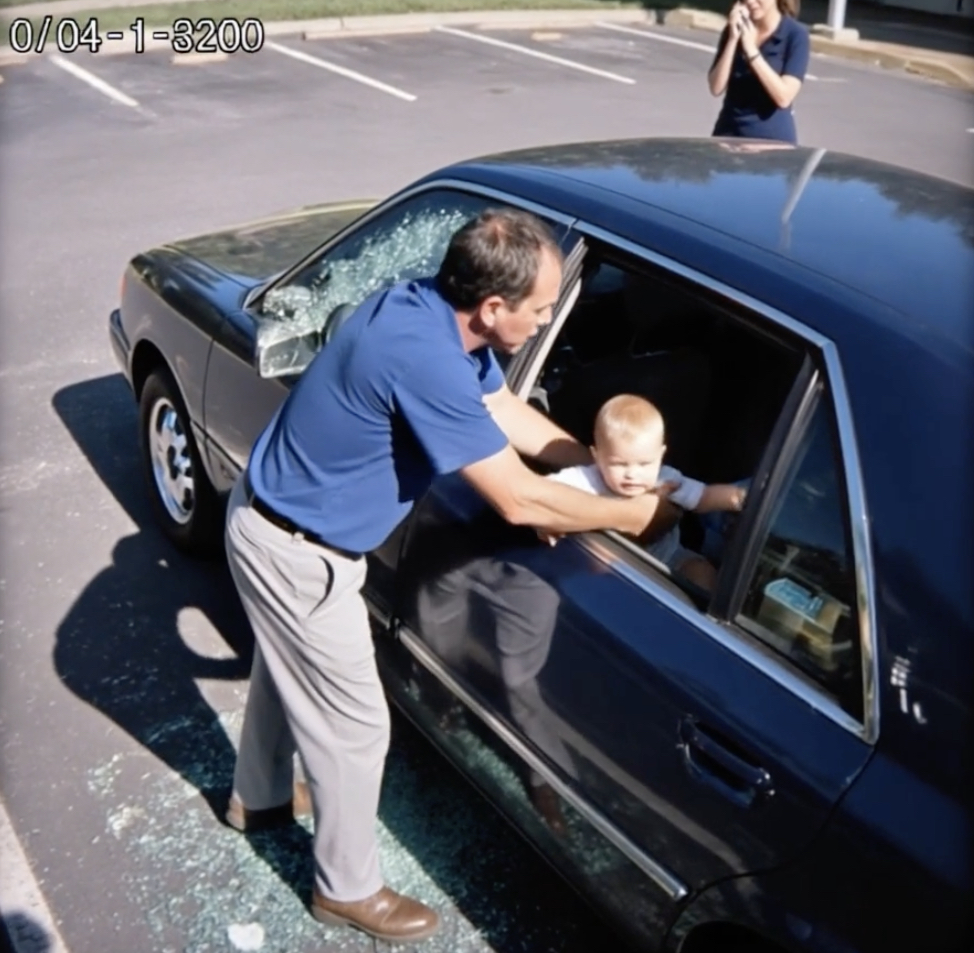 As Thomas stood there, cradling the child in his arms, he continuously whispered soothing words to the baby, who was beginning to calm down. The immediate danger had passed, and Thomas could feel the tension in his own body begin to ease. The oppressive heat of the day still lingered, but he felt a newfound sense of relief knowing he had potentially saved a life.
As Thomas stood there, cradling the child in his arms, he continuously whispered soothing words to the baby, who was beginning to calm down. The immediate danger had passed, and Thomas could feel the tension in his own body begin to ease. The oppressive heat of the day still lingered, but he felt a newfound sense of relief knowing he had potentially saved a life.
It wasn’t long before a woman, presumably the mother, came rushing into the parking lot. Her eyes widened as she saw the shattered glass and her car window broken. Her pace quickened, and she approached with a look of panic and anger mixed across her face.
Thomas prepared himself for a barrage of questions, perhaps even a thank you for his decisive actions. After all, he had just played a crucial role in rescuing her child from a potentially fatal situation. But what unfolded next left him utterly baffled.
The mother, instead of expressing relief or gratitude, immediately launched into a tirade. Her voice was loud and accusatory, her words sharp and cutting. “What have you done to my car?” she screamed, looking directly at Thomas. Her focus was entirely on the broken window, not the child who had been in distress just moments before.
Thomas, still holding the baby gently, tried to explain. “Your baby was overheated and in danger. I had to break the window to get him out safely,” he said, his voice calm, trying to placate the situation.
But the mother was having none of it. Her anger seemed to careen out of control as she continued to berate him for damaging her property. “Do you know how much that’s going to cost to fix? You had no right!” she exclaimed, ignoring the gravity of what had almost happened.
People started to gather, drawn by the commotion. Some onlookers tried to intervene, pointing out the obvious: the child’s life was far more important than the window of the car. But the mother was having none of it, her focus solely on the perceived injustice done to her vehicle.
Thomas felt a mix of emotions—disbelief, frustration, and sorrow. Here he was, having acted purely out of concern for the well-being of a defenseless child, only to be met with anger and ungratefulness. It was a surreal moment, one that made him question the world around him.
The situation escalated when a security guard from the shopping center arrived, having been alerted by the noise. He took in the scene—the broken window, the arguing mother, and Thomas holding the baby. Thankfully, the guard’s first concern was for the child. After confirming that the baby was unharmed and safe, he asked Thomas to recount what happened.
The mother, still irate, was now arguing with the security guard, demanding that Thomas be held accountable for the damages to her car. The crowd that had formed was clearly on Thomas’s side, with murmurs of support circulating around him. Yet, the mother’s reaction had left a bitter taste in everyone’s mouth.
Eventually, the police arrived, drawn by the calls from bystanders. After assessing the situation, they commended Thomas for his actions. They explained to the mother the seriousness of leaving a child unattended in a car, especially in such high temperatures.
As the scene began to wind down, Thomas handed the baby back to the authorities, feeling a sense of relief that the child was safe. Though shocked and disheartened by the mother’s reaction, he knew he had done the right thing. Sometimes, a good deed doesn’t always receive the gratitude it deserves, but the silent acknowledgment that a life was saved was enough for Thomas. This experience left everyone present questioning societal values and priorities, and hoping for a future of better awareness and appreciation.
